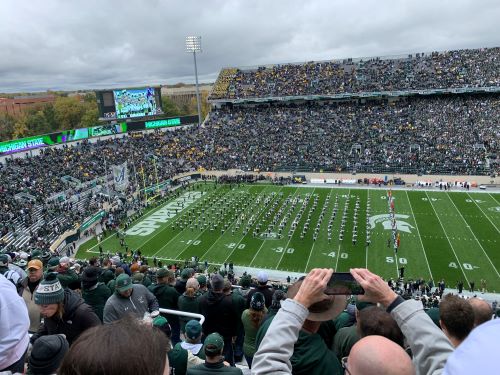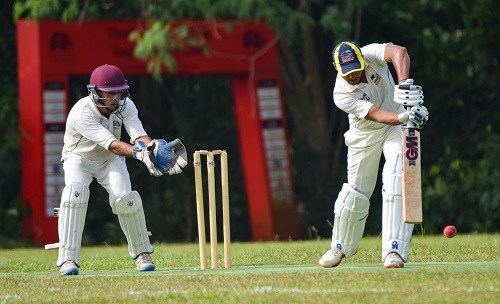Assistant Editor Connor Yeck: The roar. The screams. The bone-deep vibration of seventy-five thousand spectators trading chants and counter-chants like naval broadsides. The mist deepening to rain under stadium lights, and somewhere in it all, a slow-growing, dangerous thing taking root—hope—a feeling only truly achieved once the game clock dwindles, and the past four hours of hoarse, high-strung dread finally pass into the sureness of college football’s historical record—Michigan State 37, Michigan 33.
On the ride home from my alma mater’s late-October rivalry win (and considering Cincinnati’s own stunning season that has them in playoff contention), I quickly found myself wanting to take a look at “sports poetry” in all its forms, and to examine the power of poems to capture (and recapture) the spectacle of the court, rink, diamond, and pitch.
I’d argue the majority of poets still encounter James Wright’s “Autumn Begins in Martins Ferry, Ohio” early in workshop. Haunted by images of pre-Rust Belt life (the “ruptured night watchman” at the steel mill “Dreaming of heroes,” fathers who are “ashamed to go home” where mothers wait, “dying for love”), the poem’s final stanza offers a delirious escape from the everyday through the ritual-like violence of high school football:
Therefore,
Their sons grow suicidally beautiful
At the beginning of October,
And gallop terribly against each other’s bodies.
It’s that “Therefore,” that always catches me off guard. As if all the pain, boredom, waiting, and hope suffered throughout the year somehow promises the arrival of football, a phenomenon as sure as the changing of the season. And that’s nothing to say of the strange music in “suicidally beautiful” and “gallop terribly” —the youthful bodies of the players becoming other-than-human, perhaps better-than-human on the gridiron as they collide before a crowd.
Poetry is always seeking in-roads to memory. Some flash of recognition that will transport both speaker and reader from now to then. As for sports poetry, memories of plays made, games won, and traditions upheld showcase some of the most vibrant and fluid examples of recollection I’ve read.
Take for example Rodney Jones’s “Sweep,” in which the speaker finds himself effectively stranded in his hometown, after years away, awaiting car repairs. The poem is driven by an anxious waiting, as well as the biting tension of finding a once-familiar landscape forever altered. “I notice the smallest scintilla of change,” Jones writes, “every burnt-out trailer and newly paved road,” in “this green valley of herbicides and chemical factories.”
The poem curates a mounting, almost oppressive discomfort—returning home and feeling an insurmountable distance when glimpsing faces that “have aged twenty years since I saw them last.” But just as the piece nears its end, there’s a sudden shift. Immersed in the memory of the place, the speaker loses their footing in the present and plunges down a rabbit hole of days-gone-by:
But mostly it’s the wait, one wait after another,
and I’m dropping back deep in the secondary
under the chill and pipe smoke of a canceled October
while the sweep rolls toward me from the line of scrimmage,
and Myles Hammond, who will think too slowly
and turn his Air Force jet into the Arizona desert,
and Don Appleton, who will drive out on a country road
for a shotgun in his mouth, are cut down,
and I’m shifting on the balls of my feet,
bobbing and saving one nearly hopeless feint,
one last plunge for the blockers
and the ballcarrier who follows the sweep,
and it comes, and comes on.

No matter how many times I read “Sweep,” there’s no way to prepare for the headlong charge—a single, winding sentence seamlessly merging past and future, living and dead. I love how the speaker is so willingly overtaken by a few, glorious seconds of remembered game time, and the ease with which the poem handles this new line of thought.
To borrow from Kwame Dawes’s poem “Cricket,” we can say sports and our personal connections to them are “elemental,” and that poetry is the perfect vessel to reclaim memories once thought lost or buried. Like the end of “Sweep,” Dawes’s poem features a breathless play-by-play of past matches (“It will be short, be ready, be ready for it to pop up, take it in the chest if you must”), yet just as much as the poem is about cricket, its primary focus is wanting (needing) to write more about cricket, and to reignite a long-neglected obsession. Born in Ghana, and raised and educated in Jamaica, Dawes ultimately comes to probe the growing gap between himself and a sport he loves while living in the United States:
. . . a country where cricket does not really exist . . . Which is why I fear I am becoming somebody else living in America. I am giving something up, something as elemental as cricket.
The poem ends with an almost prayer-like promise to reforge an “elemental” connection to cricket that, while strained, never broke:
There is a language to the game, a discourse, a sense of self. I have lost much of that . . . I must write a few poems about cricket. I must.
The role of sports in understanding identity can likewise be found in Natalie Diaz’s “Top Ten Reasons Why Indians Are Good at Basketball,” whose numbered entries range from the mythic to the historical, the immediate to the vast. From “1. The same reason we are good in bed,” to “8. On the court is the one place we will never be hungry—that net is an emptiness we can fill up all day long.”
But it’s the last entry that elevates the game of basketball to something truly “elemental” in its power and promise:
10. Really, though, all Indians are good at basketball because a basketball has never been just a basketball . . . It will always be a slick, bright bullet we can sling from the 3-point arc with 5 seconds left on a clock in the year 1492, and as it rips down through the net, our enemies will fall to their wounded knees, with torn ACLs.
Here, basketball—the very act of playing it, excelling at it—becomes resistance and counter-history, the chance to go on the offensive.
Just as Wright’s “suicidally beautiful” players herald the arrival of change, and Dawes and Jones find themselves slipping into the whiplash of visceral nostalgia, Diaz shows us the power of revelation present in some form in all sports poetry. In the time it takes for the ball to pass through the net or cross into the end zone, a poem can traverse decades and centuries, unlocking experiences that, while faded, never fully vanish—part of a muscle memory from years on the field.











